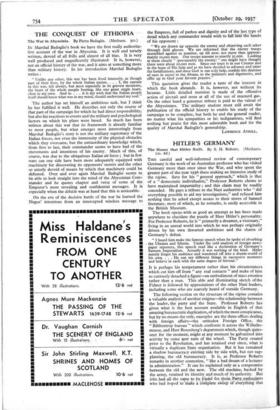THE CONQUEST OF ETHIOPIA
The War in Abyssinia. By Pietro Badoglio. (Methuen. 3os.)
IN Marshal Badoglio's book we have the first really authorita- tive account of the war in Abyssinia. It is well and tersely
written, devoid of all frills and almost of all bias. It is very well produced and magnificently illustrated. It is, however, not an official history of the war, and it aims at something more than military history. In his introduction Marshal Badoglio writes : " Unlike any other, this war has been lived intensely, as though part of their lives, by the whole Italian nation. . . . I, the captain in this war, felt always, but most especially in its gravest moments, the heart Of the whole people beating, like one great single heart, close to my own. And so . . . it is my wish that the Italian people itself should know what was in my mind, should understand my soul."
•
The author has set himself an ambitious task, but I think he has fulfilled it well. He describes not only the course of that part of the campaign for which he had direct responsibility, but also his reactions to events and the military and psychological factors on which his plans were based. So much has been written about this war that its framework is already familiar to most people, but what emerges most interestingly from Marshal Badoglio's story is not the military supremacy of the Italian forces, nor even the immensity of the physical obstacles which they overcame, but the extraordinary knowledge which, from first to last, their commander seems to have had of the movements and intentions of his enemy. Much of this, of course, was due to the ubiquitous Italian air force ; but in few wars can one side have been more adequately equipped with machinery for discovering its opponents' secrets and the other so utterly devoid of means by which that machinery could be defeated. Over and over again Marshal Badoglio seems to be able to look straight into the mind of the Abyssinian Com- mander and he quotes chapter and verse of some of the Emperor's most revealing and confidential messages. It is especially when the debdcle was at hand that this is noticeable.
On the eve of the decisive battle of the war he learned the Negus' intentions from an intercepted wireless message to the Empress, full of pathos and dignity and of the last type of detail which any commander would wish to fall into the hands of his opponent :
" We are drawn up opposite the enemy and observing each other through field glasses. We are informed that the enemy troops assembled against us number, up till now, not more than approxi- mately 10,000 men. Our troops amount to exactly 31,000. Looking at them closely " (presumably the enemy) " one might have thought there were about 20,000 men. Since our trust is in our Creator and in the hope of His help and as we have decided to advance and enter the fortifications, and since God is our only help, confide this decision of ours in secret to the Abuna, to the ministers and dignitaries, and offer up to God your fervent prayers."
This quotation gives the reader a taste of the interest in which the book abounds. It is, however, not without its lacunae. Little detailed mention is made of the offensive action of aircraft and none at all of the use of mustard gas. On the other hand a generous tribute is paid to the valour of the Abyssinians. The' military stuchnt must still await the
publication of the official history to enable his study of the campaign to be complete, but both he and the general reader, no matter what his sympathies or his indignations, will find nothing but praise for this most admirable book and for the quality of Marshal Badoglio's generalship.
LAWRENCE ATHILL.


























































 Previous page
Previous page